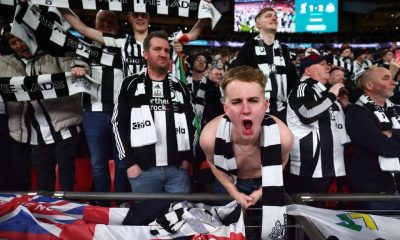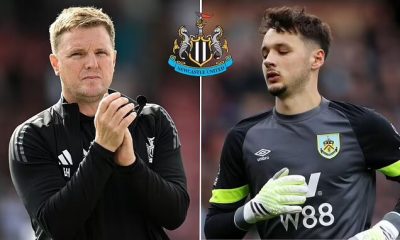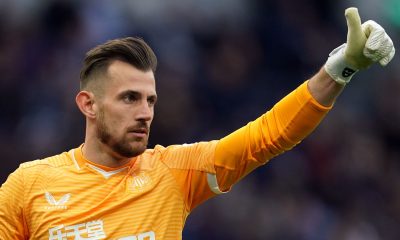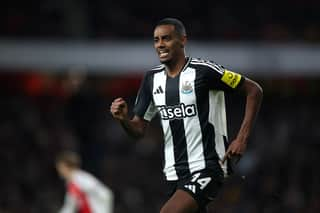Newcastle
JUST IN: Newcastle highlights Eddie Howe’s credentials As Coach
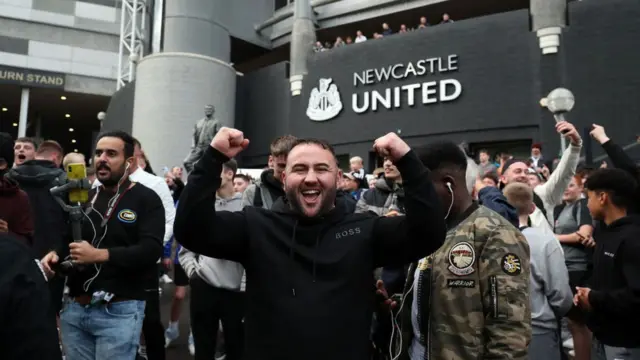
The staff at Newcastle United knew Eddie Howe was different from the rest when he detailed his Saturday matchday routine.
If kick-off was 3pm at home, he would need his office at St James’ Park ready by 9.30am to allow him time to undertake final preparations in peace and quiet. Given that even a manager as meticulous as Rafael Benítez had tended to stroll into the ground sometimes after midday on such Saturdays it was clear that Howe stood apart from his predecessors.
Where past Newcastle managers would sometimes linger at St James’ long after the final whistle, enjoying a post match drink before heading out to sociable dinners, Howe routinely goes straight his home in Northumberland. Once there his wife and three sons know he will spend part of the evening re-watching a recording of the entire match.
Related: Newcastle will fight to keep Eddie Howe after Gareth Southgate’s England exit
That routine is so entrenched that bystanders were taken by surprise when, after Newcastle beat Paris Saint-Germain in the Champions League last October, the manager, for once, remained at St James’ Park to celebrate, arriving home too late to review the match footage.
Although Newcastle ultimately, and narrowly, failed to progress from a Champions League group containing not just PSG but the eventual finalists Borussia Dortmund the tactical astuteness of that deconstruction of Kylian Mbappé and co emphasises precisely why Howe could prove an excellent successor to Gareth Southgate.
Newcastle’s manager is evidently not merely twiddling his thumbs when he routinely drives into the training ground at 6.30am every morning and, much more importantly, his extreme assiduity is reflected on the pitch.
Just ask, among others, Fabian Schär. Howe’s predecessor, Steve Bruce, was not alone in believing that the Switzerland international was unsuited to deployment in a Premier League back four. Howe had heard the theory that the centre half needed to be fielded in a back five operating a low block but envisaged a very different future for Benitez’s £3m signing. Schär remains an accomplished ball playing defender but, these days, he shines in a 4-3-3 formation and is accustomed to being part of a very high line as Newcastle press.
Extracting hitherto latent potential from individuals is something of a Howe speciality with not merely Schär but Miguel Almirón, Sean Longstaff, Joe Willock and Jacob Murphy improved beyond recognition on his watch.
Yet if the idea of Howe bringing the very best out in Phil Foden, Jude Bellingham, Harry Kane and company for England represents an enticing prospect, there are caveats. He has admitted himself his training sessions are “very difficult and demanding” and the England and Newcastle winger Anthony Gordon has said that, after leaving Everton, it took him six months to fully comprehend how he was supposed to play.
Such is the nuanced choreography of Newcastle’s pressing system that it begs the question as to whether Howe might be better suited to the day-to-day life of a club coach. Moreover something of a loner who openly admits he “cannot be friends” with fellow managers and is notoriously guarded about allowing outsiders into his inner circle might struggle with the national coach’s need to be collegiate. Could Howe persuade managers he once cold shouldered to release their stars for friendlies?
Southgate’s role in changing the culture surrounding the England team for the better and publicly confronting assorted social issues including, most notably, racism was exemplary.
Howe is equally articulate yet a manager who invariably chooses the right words at the right time and speaks in immaculately constructed sentences has consistently body-swerved non footballing discussions. Admissions that he enjoys playing the piano, taking his Boxer dog for country walks and listening to A-ha songs are about the sum of what is known of the private life of a man who sometimes avoids attention by disguising himself in hats, glasses and out-size coats.
The days when reporters and supporters bumped into Alan Pardew in Waitrose in Ponteland and Benítez in the South Gosforth branch of Sainsbury’s are long gone but part of the problem is Newcastle’s contentious Saudi ownership. Howe has consistently stonewalled questions on the subject and would not relish it being revisited by reporters covering England.
That said it is not impossible to envisage the 46-year-old becoming a little more emboldened in an England tracksuit. Howe certainly does not shy away from confrontation. After exhibiting a willingness to ask his team to take breathers by sometimes adopting street-wise gamesmanship as Newcastle finished fourth in the Premier League in 2023, he willingly crossed swords with rivals including Arsenal’s Mikel Arteta and Liverpool’s Jürgen Klopp. “We’re not here to be popular, we’re here to compete,” he told Arteta.
His Newcastle tactics bear a certain resemblance to the heavy metal of Klopp’s early Liverpool but the style Howe has evolved on Tyneside since rescuing his team from near certain relegation in 2021-22 suggests he is enough of a chameleon coach to thrive internationally.
Related: Gareth Southgate’s next step: club management, TV or well-earned rest?
Granted, he always liked to attack at Bournemouth but during a sabbatical after leaving the south coast club Howe decided he needed to “modernise” his approach along with the handwritten training sessions he had just “digitalised”.
Training ground field trips to watch Diego Simeone, Ernesto Valverde, Andoni Iraola and Maurizio Sarri at work at Atlético Madrid, Athletic Bilbao, Rayo Vallecano and Empoli respectively duly ensued. The FA can rest assured Howe remains up to date with every international tactical trend and every possible set-piece innovation.
If he can be a closed book in public, privately Newcastle’s manager likes to bond with his players. Indeed shortly after arriving on Tyneside he turned emotional while telling squad members his life story. It possibly explains why the team leap through metaphorical hoops of flame for him. Significantly all new signings are expected to similarly bare their souls.
“I’d never previously felt comfortable confiding in a manager,” Joe Willock told the Guardian last year. “But Eddie Howe’s someone I trust a lot.” England could do an awful lot worse.
has stepped down as England manager following the 2-1 defeat to Spain in the Euro 2024 final.
The head coach was expected to step down this year before a possible change of heart. Now he has left, who should take the job?
Graham Potter
The bookmakers’ favourite to take the post is Graham Potter, who has been out of work since an ill-fated spell at Chelsea came to an end in April last year.
Prior to that stint at Stamford Bridge, the 49-year-old looked to be heading to the top of the club game and it speaks volumes to how the dynamic has shifted that the England post now looks far more attainable than another crack at one of the Premier League elite.
Potter has largely kept out of the spotlight since his Chelsea exit; an article in The Athletic cited giving a key-note speech to British troops in the Falklands among his more high-profile moves. He has been linked with at least a dozen jobs, most recently at Leicester, but either rejected or not been offered the lot.
But for those willing to put a line through his 31 matches in the west London madhouse, the case for Potter remains compelling. He remains a relatively young manager burnished by unconventional experience at Ostersund, quietly impressive at in the Championship with Swansea and then noisily so in the Premier League with Brighton.
The former defender’s coaching ability is not in question and as a tactician, he is both more detailed and flexible than Southgate. The nagging question after the Chelsea debacle, though, is as to whether he has the personality to deal with the most scrutinised job in English football.
Mauricio Pochettino
While links with the likes of Jurgen Klopp feel a bit pie-in-the-sky, Mauricio Pochettino is probably the most high-profile club manager realistically within the FA’s reach and is known to want the role.
Having left Chelsea somewhat surprisingly at the end of last season, the 52-year-old is available now and his stock is as high as at any moment since leaving Tottenham five years ago.
The period in between, though, has not been the trophy-laden spell one might have expected when he departed north London as one of European football’s most highly-rated coaches and for a while looked to have the pick of the top jobs.
He chose poorly in Paris Saint-Germain, where one league title and one domestic cup in 18 months represented only a par return. That those remain the only major honours of his career tell you he is not the proven winner who might nudge Southgate’s nearly team over the line on pedigree and experience alone – but is that mould of manager out there, anyway?
Has good relationships with both stalwarts of the Southgate era, like captain Harry Kane, and stars of the future, like Cole Palmer, whose development at Chelsea last season suggests Pochettino’s knack for improving young players remains intact.
An Argentine managing the national team might be an, erm, interesting development, but Pochettino has been a prominent face in the English game for the best part of a decade now.
Eddie Howe
Eddie Howe has to be part of the conversation having been the highest-finishing English manager in the Premier League in each of the past two seasons.
Has been touted as a potential national boss since emerging as the country’s brightest young coach at Bournemouth and a fine job at Newcastle has eased long-standing concerns that south coast comforts were key to his success.
Leading the Toon into the Champions League last season was an achievement ahead of schedule and reviving what looked to be a spiralling campaign this term was equally impressive, particularly given a raft of injury problems. Ironically, had he not done so he might be out of a job this summer and thus free to take the England post.
Clearly, would not benefit from the transfer market backing afforded at St. James’s Park but for every new big-money signing like Alexander Isak, Anthony Gordon or Bruno Guimaraes, there has been a Miguel Almiron, Jacob Murphy or Joelinton, players already on the books whose performances have been transformed.
But one of Southgate’s great achievements has been in bringing an outspoken social conscience to the role, whereas the Newcastle manager is of the ’stick to football’ mould.
Lee Carsley
Were the FA to put faith in their own pathway by staying in-house in the search for a Southgate successor, then Lee Carsley – who rejected the Republic of Ireland job earlier this year – would be the standout candidate.
The ex-Everton man has been England U21s boss since 2021 and as such has already worked with a number of the young stars to have broken into the senior squad in recent years.
The side that won last summer’s U21 European Championship included two players who featured at Euro 2024 in Anthony Gordon and Palmer, as well as several others likely to be part of the set-up going forward, such as Jarrad Branthwaite, Curtis Jones and Levi Colwill.
To the wider public, 50-year-old’s appointment would clearly be unsexy, but more concerning to the FA would have to be his lack of experience, with the former midfielder yet to manage a senior side on a permanent basis at any level.
Southgate, of course, stepped up from the U21s himself, but had already managed Middlesbrough earlier in his career and did so in extraordinary circumstances after Sam Allardyce’s sacking, having famously felt he was not ready for the job when Roy Hodgson resigned after Euro 2016.
Thomas Frank
A left-field option but Brentford boss Thomas Frank is at least an established face in the English game and has experience within a national set-up having worked with Denmark’s youth teams for half a decade.
Frank has proven himself versatile, his Brentford team playing dazzling football in the Championship and then more pragmatic stuff when the scenario has demanded it in the Premier League. Often, he changes seamlessly between formations from week to week, an underrated aspect of England’s last two Euros campaigns.
His managerial attributes echo the best of Southgate: loyal, adored by his players, confident and thoughtful in the press, open-minded and unorthodox in hunting for every edge.
Would he want the gig, at a time when his stock is still rising and links with top clubs aplenty? That is one of the unknowns. But with the obvious candidates all a bit mediocre, the question would be worth asking.
Gareth Southgate’s resignation as England manager ends his eight-year reign in charge of the national team and could also bring down the curtain on the tournament careers of some key members of the current squad.
With two years until the 2026 World Cup, how many players will retain their place? And which areas of the squad will see the most turnover?
Goalkeepers
Jordan Pickford will be 32 by the time of the 2026 World Cup. While that is not old for a goalkeeper, he can expect to be under serious pressure for his place by that point.
Aaron Ramsdale’s club future could be the key issue here. If he makes the right move away from Arsenal, and then continues his development, he could feasibly snatch Pickford’s No 1 shirt quite soon. Especially if Southgate – one of Pickford’s biggest champions – is not in charge. It is also worth keeping an eye on the development of James Trafford.
Defenders
Kyle Walker will be 36 in 2026, which surely makes it unlikely that he will still be England’s first-choice right-back. Kieran Trippier, meanwhile, will be 35. Trent Alexander-Arnold’s time should finally come, then, although it remains to be seen how his Liverpool career will develop following the departure of Jürgen Klopp.
As it stands, it is hard to see a way in which Ben White can return to the international fold. However, if a new coaching staff comes in, the Arsenal defender could quickly become an important player for his country, and the main competition to Alexander-Arnold at right-back. Don’t forget Reece James, either. He will be 26 in two years, which should mean he is coming into his prime.
As for the emerging right-backs, Rico Lewis and Tino Livramento appear to be the most likely contenders to establish themselves in the England squad over the next two seasons.
At centre-back, Marc Guehi and John Stones will be 26 and 32 respectively. It is highly possible that they remain the first-choice defenders, although Levi Colwill, Jarrad Branthwaite and Jarell Quansah are all developing promisingly. Colwill is left-footed, which could give him the edge if he can play consistently at club level.
As for the left-backs, Luke Shaw can expect to remain in the fold. He will be 31 in 2026, which is certainly not too old to be starting regularly. Can Ben Chilwell rediscover his form? Can Lewis Hall fulfil his potential? As it stands, Shaw seems the most likely option, although he could be under threat if Colwill plays regularly as a left-back at club level.
Midfielders
Declan Rice is one of the most important players in this England squad and he will surely be central again, fitness permitting. He will be 27, in his prime, during the 2026 World Cup. Jude Bellingham is not going anywhere, either, while the same can be said for Phil Foden.
The development of Kobbie Mainoo and Adam Wharton, the two young guns at Euro 2024, will be fascinating. On paper, there is no reason why they would not be involved, but young players do not always follow the path that has seemingly been laid out for them.
Liverpool duo Harvey Elliott and Curtis Jones will be among those hoping to challenge for a place by the summer of 2026, if not sooner. Can young Archie Gray, who has just swapped Leeds United for Tottenham Hotspur, fulfil his enormous potential? Newcastle United’s Lewis Miley is another exciting youngster, although 2026 might come too soon.
Slightly further forward, Cole Palmer will expect to remain in the picture after his excellent tournament in Germany. Will Eberechi Eze still be playing for Crystal Palace? Will Mason Mount find his feet at Manchester United? Morgan Gibbs-White is a rising force to watch, as is Morgan Rogers.
Wingers
Bukayo Saka will be 24 at the next World Cup and it is hard to imagine a scenario in which he is not a starter for England. Jarrod Bowen, however, will be 29. He could be under pressure from the likes of Noni Madueke, Jadon Sancho (depending on how his club career develops) and young Jamie Bynoe-Gittens, currently of Borussia Dortmund.
The career arcs of Raheem Sterling (who will be 31) and Jack Grealish (who will be 30) will be fascinating. You would not rule out either of them making a comeback to the international stage. The same is true of Marcus Rashford, who will be 28.
Anthony Gordon is on the right path, clearly. Perhaps Harvey Barnes could rediscover the form that led to his call-up in 2020.
Strikers
Will Harry Kane remain the first-choice striker for England at the age of 32? Based on the form he showed this summer, the answer is no. But his fitness was clearly a significant issue in recent weeks, and there is no reason why a fully-fit Kane could not be hugely effective in two years. He has never relied on pace, anyway.
As for the others… Well, it is hard to say. Ollie Watkins will be 30, and his game is more reliant on physical speed and power. Ivan Toney will also be 30. Both players will surely be in the mix, but it is hard to say with any certainty that they will be better than they are now. It might simply come down to pre-tournament form and sharpness.
In truth, there is not a long list of youngsters ready to take over the centre-forward position. Tammy Abraham and Dominic Calvert-Lewin are already beyond the age of 25. Kane looks relatively secure, for now.
Predicted team (4-3-3)
Ramsdale; Alexander-Arnold, Stones, Guehi, Colwill; Mainoo, Rice, Bellingham; Saka, Kane, Gordon.
Predicted 26-man squad
Goalkeepers
Aaron Ramsdale, Jordan Pickford, James Trafford.
Defenders
Trent Alexander-Arnold, Reece James, Ben White, John Stones, Marc Guehi, Jarrad Branthwaite, Levi Colwill, Luke Shaw.
Midfielders
Declan Rice, Kobbie Mainoo, Jude Bellingham, Cole Palmer, Adam Wharton, Curtis Jones, Harvey Elliott, Morgan Gibbs-White.
Forwards
Harry Kane, Ollie Watkins, Bukayo Saka, Phil Foden, Anthony Gordon, Jack Grealish, Marcus Rashford.

